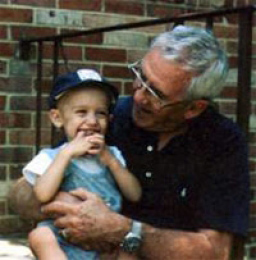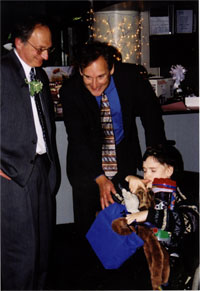
It was hard to believe that a baby could be diagnosed with such a serious condition as a brain tumor. Russ was a happy infant who developed normally but by age one he was very thin for his age and had some slight jiggling in one eye. After two days of tests, a CAT scan revealed a large tumor in the optic nerves (affecting vision), and the hypothalamus (affecting sleep, appetite, mood and water balance). We were told it was benign because it was slow growing. I remember how traumatic it was to see such a little body put into such a big x-ray machine with so many lines hooked up to him. Little did I know that this was only the beginning of several years of invasive procedures for our little boy.
At age one Russ embarked upon two years of chemotherapy. A catheter was surgically placed in his chest to be used for blood draws and chemotherapy infusions. He also received his nutrition through a catheter, but soon a second tube was placed in his stomach for feedings by pump at night, he did that for the next nine years. At age three, after several infections, catheter replacements, non-stop vomiting, and a tumor that refused to stop growing, Russ had five weeks of radiation to his brain. He was so young that he had to be sedated for each day’s treatment. Radiation stopped his tumor from growing for four wonderful years. In that time, Russ went to school, rode a bike, and did most things that normal children do. Unfortunately, the radiation delayed his normal growth such that he was short, and his IQ remained in the toddler range, and he never became fully potty trained.

Thanks to special education classes and services, he managed to make progress in school and become independent.
When Russ’s tumor began growing again, the shunts that had been placed in his brain (to relieve the build-up of spinal fluid) kept getting blocked, and over the course of four years, he endured 15 surgeries to replace them. He also had surgery to try and remove some of the tumor it left him blind. It was amazing how he adjusted to his sudden blindness, despite his frustrations with it. Two years after this, he awoke one night screaming, vomiting, and unable to walk. After three years of rehabilitation for his right-sided weakness, he still cannot walk or dress himself.
Recently Russ’s tumor has been treated with thalidomide and gleevec, cancer-fighting pills that have no toxic side effects. Thanks to ongoing research that is funded by The Childhood Brain Tumor Foundation (CBTF), newer and safer therapies are being developed. CBTF also offers parents emotional support, advocacy services, and current medical information on their child’s illness. Despite all of the painful and debilitating things that happened to Russ, he continues to be a happy, chatty, active and independent 16-year-old. He wrestles with his brother; plays with his toys; listen to tapes and books; and goes on stroller rides to stores or through the neighborhood. He is the most persevering and upbeat kid (or adult) that I have ever come across. We don’t know how long we will have Russ, but while he’s here, he teaches our family daily about positive attitude, bravery and determination.
Russ lost his battle to brain cancer in February 2006.
Written by Elizabeth Irvin, Founder of the Childhood Brain Tumor Foundation.
This story was written for the Childhood Brain Tumor Foundation, Germantown, MD.
